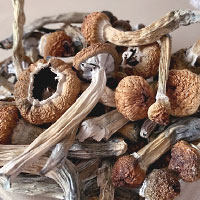Depression Improves Following Single Dose of Psilocybin
Abstract
Patients with treatment-resistant depression who receive a single dose of psilocybin may experience a reduction in depression symptoms.

Patients with treatment-resistant depression who receive a single 25-mg dose of psilocybin coupled with psychological support may experience a reduction in depression symptoms for at least three weeks. Similar results were not seen in patients who received a single 10-mg dose of psilocybin. The findings were published in the New England Journal of Medicine.
The trial—conducted at 22 sites in 10 countries—included 233 adults with treatment-resistant depression; 90% of the participants had no prior experience with psilocybin. The participants were randomized to receive one of three doses of psilocybin (1 mg, 10 mg, or 25 mg) followed by a six-to-eight-hour therapy session. The participants also received two shorter follow-up therapy sessions one day and one week after receiving psilocybin.
After three weeks, the participants’ scores on the Montgomery–Åsberg Depression Rating Scale (MADRS) dropped by 12.0 points in the 25-mg group, 7.9 points in the 10-mg group, and 5.4 in the 1-mg group; the difference between the 25-mg and 10-mg groups was statistically significant whereas the difference between the 10-mg and 1-mg groups was not. In addition, 37% of adults taking the 25-mg dose experienced a treatment response (at least 50% reduction in MADRS score), compared with 19% taking the 10-mg dose and 18% taking the 1-mg dose.
From day 2 to week 3, severe adverse events were reported by 9% of the participants in the 25-mg group and 7% in the 10-mg group, compared with 1% of those in the 1-mg group, the researchers noted. The adverse events included a few instances of suicidal ideation or self-injury.
“[S]uicidality demands clinical vigilance in future trials of psilocybin for depression,” they wrote. ■
Goodwin GM, Aaronson ST, Alvarez O, et al. Single-Dose Psilocybin for a Treatment-Resistant Episode of Major Depression. N Engl J Med. 2022; 387(18): 1637-1648.



